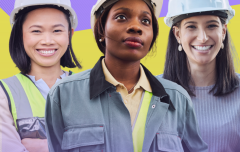Women's Month staff spotlight – Divya Kottadiel
My name is Divya Kottadiel and I’m originally from Mumbai, India. As Senior Specialist at SEforALL’s UN-Energy programme, I work closely with colleagues from the UN system on shared initiatives that advance Sustainable Development Goal 7 (SDG7) globally. One of my key areas of work is on the Energy Compacts, which is a mechanism that brings together a range of stakeholders, including governments and the private sector, to raise ambition and accelerate collaborative action towards transitioning to sustainable and clean energy sources.
Reflecting on your involvement in various SEforALL projects & initiatives, could you highlight one that you found particularly impactful in advancing the inclusion and empowerment of women?
The Energy Compact network includes coalition-based commitments focused on under-addressed themes linked to SDG7, aiming to bring together multiple stakeholders to agree on a set of principles of common goals. One such Energy Compact is focused on the link between SDG7 and SDG5 – the Gender-Energy Compact, which was launched to catalyse action towards gender equality and women’s empowerment to accelerate a just, inclusive and sustainable energy transition. This coalition is a good example of the catalytic action that is needed to advance the inclusion and empowerment of women with close to 90 signatories from national governments, the private sector, NGOs, multilateral or intergovernmental agencies, youth organizations, and financial institutions.
In addition, SEforALL’s STEM Training programme that provides young women with technical training and hands-on project installation experience has proved to be impactful in supporting women in developing the skills and expertise needed to enter the clean energy workforce.
What do you perceive as one of the primary challenges in fostering women's increased participation in the sustainable energy sector?
Gender stereotypes and biases within the industry and broader society are one of the challenges that exist in the sustainable energy sector. These stereotypes can create barriers to entry and advancement for women in specific clean energy roles. For example, there may be assumptions that certain technical or leadership roles are more suitable for men, leading to fewer opportunities for women to enter or progress in those positions. Additionally, unconscious biases in hiring and promotion processes can disadvantage women, perpetuating gender imbalance in the sector.
Addressing these stereotypes and biases requires concerted efforts to promote diversity and inclusion within sustainable energy organizations. This can involve implementing gender-neutral recruitment and promotion practices, providing training to raise awareness of unconscious biases, and actively fostering a supportive and inclusive work environment where all employees have equal opportunities to thrive.
Furthermore, the renewable energy industry often requires a strong network of connections and mentorship opportunities for career advancement, which may be less accessible to women due to existing gender dynamics within the industry.
What guidance or advice would you extend to women who aspire to establish careers in sustainable energy?
Sustainable energy is a rapidly evolving field with diverse career paths, which can span different sectors and disciplines. There are roles available for individuals with various skills, backgrounds and interests – all of which are needed to contribute to the transition towards a more sustainable energy future. These include renewable energy project development, engineering, planning and consulting, policy advocacy, research, finance and investment, education and outreach, and many others.
Pursue education and training, but also seek practical, hands-on opportunities to gain experience while being open to exploring different roles within the clean energy sector. Build professional connections and seek out mentors who can provide guidance, support, and valuable insights into navigating a career in renewable energy.
Lastly, use your voice to advocate for diversity and inclusion in the renewable energy sector, and actively support initiatives aimed at increasing representation of women and underrepresented groups in the industry.




